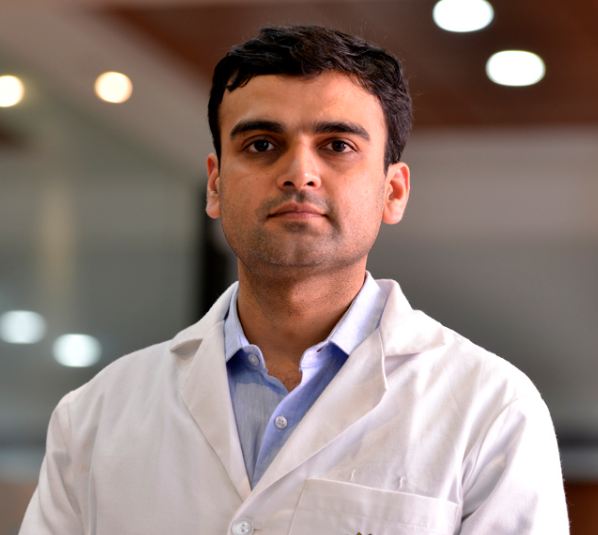Best Hair Transplant Surgeons in Indore
Hair Transplant Surgeon :
Are you experiencing hair loss or thinning and seeking expertise for a hair transplant in Indore? Skedoc can help you find the best hair transplant doctors in indore.
A hair transplant is a surgical procedure where hair follicles from a donor area, typically the back of the head, are transplanted to the bald or thinning areas. This procedure is often performed by dermatologists, plastic surgeons, or specifically trained surgeons in the field of hair restoration. They carefully extract and implant the follicles, aiming to restore natural hair growth and improve appearance. It is crucial to choose a doctor with specialized training and experience in hair transplant surgery for optimal results. Skedoc provides a list of top doctors for hair transplants who are experienced and offer affordable hair transplant costs.
13 Hair Transplant Surgeons found
Dr. Sanjay Kucheria
MBBS, MS, MCh (Plastic Surgery)
Fellow in Microsurgery & Maxillofacial surgery
Fellow in Cosmetic Surgery
Plastic Surgeon
View Profile
11, 2, Near Palasia
Near Cs Naidu Aracade
New Palasia, Indore
Get directions

OP Timings
Mon - Tue,Thu - Sat | 12:00 noon - 01:00 pm |
Fee : 1200
#178, Scheme No. 78 II
Near Kanak Hospital
Vijay Nagar, Indore
Get directions

OP Timings
Mon - Sat | 04:00 pm - 07:00 pm |
Fee : 1200
Plot No. 8, PU04
Commercial Scheme 54
Vijay Nagar, Indore
Get directions

OP Timings
Fee : 1000
Scheme No-94, Plot No- 304
Near Bengali Chouraha, Ring Road
Indore Kanadia Road, Indore
Get directions
No 1, BCM Estate
Sri Badalchand Mehta Marg
Nipania, Indore
Get directions

OP Timings
Mon - Sat | 10:00 am - 05:00 pm |
Fee : 1000
318, Ranjeet Hanuman Road
Annapurana Road, Usha Nagar Ext
Usha Nagar, Indore
Get directions

OP Timings
Fee : 1000
14, Manik Bagh Road
Near Choithram School
Manikbagh, Indore
Get directions

OP Timings
Mon,Wed,Fri | 10:00 am - 05:00 pm |
Fee : 700
1, Prakash Nagar Square
Nemawar Rd
Navlakha, Indore
Get directions

OP Timings
Mon - Sat | 01:00 pm - 03:00 pm |
Fee : 900
Near L.I.G Square
RSS Nagar
AB Road, Indore
Get directions

OP Timings
Fee : 1000
14, Anoop Nagar
LIG Square
AB Road, Indore
Get directions

OP Timings
Fee : 1000
202, Brijkamal 84
Swami Vivekananda Nagar
Indore Kanadia Road, Indore
Get directions

OP Timings
Mon - Sat | 06:00 pm - 08:00 pm |
Fee : 1000
7, Sindhi Colony
Bhawarkua Main Rd, Sindhu Nagar
Sapna Sangeeta, Indore
Get directions

OP Timings
Fee : 700
Plot No. 9A/FA
Ring Road, Near Sanghi Brother
Old Palasia, Indore
Get directions

OP Timings
Mon - Sat | 09:00 am - 01:00 pm |
Fee : 500
Scheme No-94, Plot No- 304
Near Bengali Chouraha, Ring Road
Indore Kanadia Road, Indore
Get directions
11, Sarju Prasad Marg
Kanchanbaug Road
South Tukoganj, Indore
Get directions
Ganga Jamuna Apartment
Near Nath Mandir
South Tukoganj, Indore
Get directions

OP Timings
Mon - Sat | 03:00 pm - 06:00 pm |
Fee : 500
Near L.I.G Square
RSS Nagar
AB Road, Indore
Get directions

OP Timings
Fee : 1000
Scheme No. 94, Sector 1
Near Teen Imli Square
Ring Road, Indore
Get directions

OP Timings
Mon - Fri | 01:00 pm - 03:00 pm |
Fee : 800
AH-28, MR 10 Road
Pandit Dindayal Upadhyay Nagar
Sukhliya, Indore
Get directions

OP Timings
Fee : 700
Scheme No 74, CH-3
Near Prestige College
Vijay Nagar, Indore
Get directions

OP Timings
Mon - Sat | 10:00 am - 12:00 noon, 06:00 pm - 08:00 pm |
Fee : 700
Bombay Hospital
Vijay Nagar
IDA Scheme No.94/95
Eastern Ring Rd, Tulsi Nagar
Vijay Nagar, Indore
Get directions

OP Timings
Mon - Sat | 10:00 am - 05:00 pm |
Fee : 800
Bombay Hospital
Vijay Nagar
IDA Scheme No.94/95
Eastern Ring Rd, Tulsi Nagar
Vijay Nagar, Indore
Get directions

OP Timings
Mon - Sat | 11:00 am - 04:00 pm |
Fee : 1500
120 , Labriya Bheru Nagar
Opposite Kastoor Cinema
Dhar Road, Indore
Get directions

OP Timings
Fee : 700
2-3, Scheme No 44
Bhawar Kuan Road
AB Road, Indore
Get directions

OP Timings
Fee : 700
5/1, Bhawarkua Main Rd
Transport Nagar
Navlakha, Indore
Get directions

OP Timings
Fee : 500
Dr. Anil Kumar Garg
MBBS, MS, MCh (Plastic Surgery)
Fellowship in Micro Vascular Surgery
Fellowship in Peripheral Nerve Surgery
Plastic Surgeon
View Profile
Rejuvenate Hair Transplant Centre
New Palasia
2/1, R.S. Bhandari Marg
Near Nagar Nigam Shops
New Palasia, Indore
Get directions

OP Timings
Tue - Sat | 12:00 noon - 02:00 pm, 05:00 pm - 07:00 pm |
Fee : 1000
Shalby Hospital
Old Palasia
Part 5 & 6, Race Course Road
R S bhandari Marg
Old Palasia, Indore
Get directions

OP Timings
Mon - Sat | 11:00 am - 01:00 pm |
Fee : 800
View Profile
Nyay Nagar Bridge, 179
Nyay Nagar Main Rd
Sukhliya, Indore
Get directions

OP Timings
Mon - Sat | 12:30 pm - 02:30 pm, 04:30 pm - 06:00 pm |
Fee : 700
Sector-D, Scheme No 74C
Near Power House
Vijay Nagar, Indore
Get directions

OP Timings
Fee : 700
What is hair transplantation?
Hair transplantation is a surgical procedure aimed at addressing bald or thinning areas on the scalp. Typically performed by dermatologists or plastic surgeons, the process involves taking small pieces of skin with healthy hair, known as grafts, from a donor site (often the back of the scalp) and transplanting them to areas with hair loss. This can help treat permanent hair loss resulting from conditions like alopecia areata, androgenic alopecia, thyroid diseases, hormonal imbalances, traumatic injuries, or burns.
The most common technique is grafting, where tiny scalp pieces containing healthy hair are moved to hairless regions. Other methods include scalp reduction, flap surgery, and tissue expansion. The procedure offers benefits such as a fuller head of hair and improved self-esteem. Recovery is typically swift, with most patients resuming regular activities within days, and final results becoming evident after about a year. Regular follow-ups with the hair transplant surgeon are crucial to ensure proper healing and address any complications promptly.
How do you prepare for a Hair transplant surgeon consultation?
Preparing for a hair transplant surgeon consultation involves several key steps.
- Firstly, gather information about your medical history, including any existing health conditions and medications
- It's essential to be transparent about your lifestyle, habits, and expectations for the procedure
- Bring photos showcasing your desired hair goals and any questions you may have
- Research and jot down queries about the surgeon's experience, previous cases, and the specific transplant techniques they recommend
- Understand the cost and potential insurance coverage
- Plan for a physical examination of your scalp during the consultation
- Lastly, mentally prepare for an open discussion about realistic outcomes and potential risks
What are the common conditions seen by Hair transplant surgeons?
Hair transplant surgeons commonly encounter various conditions related to hair loss. One prevalent condition is androgenic alopecia, often referred to as pattern baldness, affecting both men and women. Alopecia areata, an autoimmune disease attacking hair follicles, is another frequent concern.
Surgeons may also address hair loss resulting from thyroid diseases, hormonal imbalances, traumatic injuries, or burns. Patients seeking hair transplants typically present with permanent hair loss, necessitating surgical intervention.
Surgeons assess the extent of baldness, overall health, and realistic expectations to determine candidacy for the procedure. By addressing these diverse conditions, hair transplant surgeons aim to provide effective solutions for individuals seeking to restore hair in areas affected by various forms of alopecia and other underlying causes of hair loss.
Frequently asked questions
How does one become a Hair transplant surgeon?

To become a Hair Transplant Surgeon, one typically needs a medical degree (MBBS) followed by a specialization in dermatology or plastic surgery. After completing the necessary qualifications, aspiring surgeons can undergo specific training in hair transplant techniques. This may include hands-on experience and participation in workshops or courses dedicated to hair restoration procedures. Gaining expertise in both surgical and aesthetic aspects is crucial for a successful career in hair transplant surgery. Continuous learning and staying updated on advancements in the field contribute to becoming a proficient Hair Transplant Surgeon.
What would be the consultation fees of a Hair transplant surgeon?

The consultation fees for a Hair Transplant Surgeon in Indore can vary depending on the doctor's expertise, clinic reputation, and the complexity of the case. On average, it ranges from INR 500 to INR 2,000 or more. It's advisable to inquire about the specific fees when scheduling an appointment, as some clinics may offer package deals that include both consultation and procedure costs.
What is the cost of Hair Transplant in Indore?

The cost of a hair transplant can vary based on factors like the clinic's reputation, the surgeon's expertise, and the number of grafts needed. On average, it ranges from INR 30,000 to INR 1,00,000 or more. Affordable options are available, but it's crucial to consider the surgeon's experience and the clinic's facilities for optimal results.
What are the signs and symptoms seen in pre-hair loss conditions?

Early signs of pre-hair loss conditions may include increased hair shedding, a widening part, or a noticeable decrease in hair density. Individuals may also experience an itchy scalp, dryness, or changes in hair texture. These early indicators suggest potential hair loss concerns, and consulting with the best hair transplant surgeon can help diagnose and address the issue promptly.
What kind of treatments do Hair transplant surgeons provide?

Hair transplant surgeons offer treatments primarily focused on restoring hair growth. Common procedures include:
- Follicular Unit Transplantation (FUT): Involves harvesting a strip of scalp to extract follicles for transplantation.
- Follicular Unit Extraction (FUE): Individual follicles are extracted from the donor area for transplantation.
- Platelet-rich plasma (PRP) Therapy: Injections of concentrated platelets to stimulate hair growth.
- Scalp Micropigmentation (SMP): Mimics the appearance of hair follicles through tattooing.
Can hair transplant doctors in Indore make the hair appear all-natural?

Yes, the best hair transplant doctors in Indore can achieve natural-looking results. Skilled surgeons employ advanced techniques like Follicular Unit Transplantation (FUT) or Follicular Unit Extraction (FUE) to harvest and transplant hair follicles precisely. By mimicking the natural growth pattern and direction of existing hair, they ensure a seamless integration. Attention to detail, artistic skills, and experience play vital roles in creating a result that appears authentic. Additionally, advancements in technology and expertise contribute to minimizing scarring and promoting a natural appearance post-surgery. Choose a qualified and experienced hair transplant doctor for optimal outcomes.
Can I choose the type of hair I want and share my preference with hair transplant doctors nearby?

Yes, you can discuss and share your hair preferences with hair transplant doctors nearby. During your consultation, experienced surgeons will consider factors such as hair type, texture, colour, and overall aesthetic goals. They aim to customize the procedure to meet your specific desires, ensuring a result that aligns with your expectations. Effective communication with your surgeon about your preferences, lifestyle, and expectations is essential for a personalized and satisfactory outcome.
Is the hair transplant surgery painful?

Hair transplant surgery is typically performed under local anaesthesia, making the procedure itself largely painless. Patients might feel some discomfort during the administration of anaesthesia and minor sensations like pressure during the surgery. After the procedure, some individuals may experience mild pain or soreness, but this can usually be managed with prescribed medications. Advances in techniques and anaesthesia have significantly minimized the discomfort associated with hair transplant surgery.
Should I immediately go for surgery if I am having a heavy hair fall?

Hair transplant surgery is not typically the first step for individuals experiencing heavy hair fall. It is advisable to explore non-surgical options and address the underlying causes of hair loss before considering surgery.
Consulting with a dermatologist or a hair specialist can help identify the root cause of hair fall, whether it be genetic, hormonal, nutritional, or related to other factors. Non-surgical treatments may include medications, topical solutions, and lifestyle changes. If these measures prove ineffective, then hair transplant surgery might be considered a more permanent solution, but it is essential to undergo a thorough evaluation and discuss options with the best hair transplant surgeon.
Are there any legal rights for hair donors?

Hair donors typically do not have specific legal rights regarding their donated hair. Once hair is cut or extracted for transplantation, it is considered a medical waste or discarded material. However, it's important for individuals considering hair donation or transplant to carefully review and discuss any contractual agreements or terms with the medical professionals involved.
Where can I find the best Hair transplant surgeon in Indore?

Skedoc can help you find the best Hair Transplant Surgeons near you. The platform provides a curated list of experienced and specialized surgeons in the field of hair restoration. You can easily access information about these surgeons, including their expertise and patient reviews, and book appointments with your preferred specialists.


















